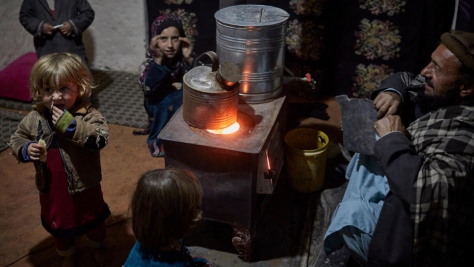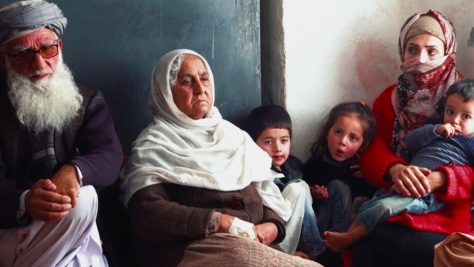16 Days Against Violence: UNHCR deeply disturbed by scale of violence against women
In 2012, some 12,000 incidents of sexual and gender-based violence were reported to UNHCR around the world, but many more cases never come forward.

Syrian refugee children attend a class in the Bekaa Valley, Lebanon. UNHCR chief António Guterres says humanitarian crises, like the conflict in Syria and Typhoon Haiyan in the Philippines, disproportionately affect children and adolescents and make them vulnerable. © UNHCR/S.Baldwin
GENEVA, November 25 (UNHCR) - UN High Commissioner for Refugees António Guterres said on Monday that the scale of sexual and gender-based violence was "deeply disturbing" despite the efforts of UNHCR and its partners to counter the "heinous" human rights abuse.
"In 2012, some 12,000 incidents were reported to UNHCR, but many more cases never come forward," Guterres said in a message to staff to mark the start of the annual 16 Days of Activism against Sexual and Gender-Based Violence.
He said that under this year's theme, "Safety in School," UNHCR aims to bring together boys and girls, teachers, parents, communities and partners to find durable and community-based solutions to prevent sexual and gender-based violence (SGBV) in school.
Guterres noted that humanitarian crises, like the conflict in Syria and Typhoon Haiyan in the Philippines, disproportionately affect children and adolescents. "Loss of family members, homes and ultimately futures, but also pre-existing gender inequalities and disruption of protective systems make boys, girls and youth extremely vulnerable to sexual and gender-based violence," he stressed.
The High Commissioner added that an estimated 60 million girls around the world are sexually assaulted on their way to school every year. Many boys and girls also face such violence in their classrooms and playgrounds. "This heinous human rights violation also carries significant human, social, and economic costs to our societies," he said.
"Recognizing the multi-faceted risks of SGBV that children and adolescents face, and the protective role education can play, UNHCR has focused in 2013 on integrating its strategies in the three core protection areas of SGBV, child protection and education," he explained. "Many operations are already developing mutually reinforcing programmes to protect girls and boys of concern from SGBV in school settings."
Guterres pledged that UNHCR, working closely with local partners and national authorities, would scale-up efforts to ensure safe learning environments, including through parent-teacher associations, youth clubs, extracurricular activities, the enforcement of codes of conduct, and confidential referral mechanisms for students to access health and psychosocial services.
"We know that by adopting a gender-sensitive approach to multisectoral services, for example by building separate latrines in schools or promoting the recruitment of female teachers among other measures, we can make girls and boys safer in school," he said.
Guterres noted that 148 UNHCR offices were implementing SGBV prevention and response programmes this year, making SGBV one of the highest selected objectives in country plans. But he added that safe learning environments "remain an under-programmed area in UNHCR operations."
UNHCR offices across the world, including the refugee agency's headquarters in Geneva, are holding events to mark the 16 Days of Activism and today's International Day to Eliminate Violence Against Women. For example, in addition to organizing cultural activities such as dancing, the UNHCR team in Burundi has also launched SGBV-related quizzes in schools as well as performances by teachers and students. Their objective is to focus on youth in order to help them understand how to prevent SGBV in schools, how to change behaviour in the long term to be more respectful of girls and women.
The 16 Days of Activism is an international campaign originating from the first Women's Global Leadership Institute in 1991. The 16 Days of Activism will run through to International Human Rights Day on December 10. It brings together UNHCR, partners, persons of concern and host communities worldwide in a united call to end sexual and gender-based violence in all its forms.
-

States urged to build on progress made since Global Refugee Forum
16 Dec 2021 Increased responsibility sharing by governments is key to maintaining momentum in finding new approaches to global displacement, UNHCR's Grandi tells officials. -

Emerging Lessons from World Bank Group Social Protection Investments in Refugee-Hosting Areas
16 Dec 2021 This review considers UNHCR support to eight RSW-funded social protection projects managed by the WBG Social Protection and Jobs (SPJ) Global Practice, in Bangladesh, Mauritania, Djibouti, the Democratic Republic of Congo (DRC), the Republic of Congo (RoC), Burkina Faso, Cameroon, and Chad. -

UNHCR and Community of Sant'Egidio sign agreement to address refugee challenge globally
16 Dec 2021 -

Inclusion of Refugees in Government Social Protection Systems in Africa
16 Dec 2021 This study is undertaken to better understand the inclusion of refugees in government social protection programmes in eight countries in Africa. It maps and reviews the enabling factors for inclusion and formulates recommendations for action, drawn from the evidence base provided by UNHCR Country Offices, complemented by analysis of social protection focal points by the three Africa Regional Bureaus (RBs) and the Division of Resilience and Solutions (DRS). -

Displaced families in Kabul caught in downward spiral
16 Dec 2021 Months after fleeing to Afghanistan's capital, aid is the only lifeline for many displaced families trying to survive a winter of soaring unemployment and food costs. -

Evaluation of UNHCR's Level-3 emergency response to cyclone Idai
15 Dec 2021 -
High Commissioner's remarks at the closing of the High Level Officials Meeting
15 Dec 2021 -

Afghanistan on the brink - displaced families face "humanitarian catastrophe"
15 Dec 2021 -

Without documents, women at high risk of gender-based violence
15 Dec 2021 UNHCR is advocating for women and girls in South Africa to acquire identity documents which can help reduce the risk of statelessness, and physical and psychological abuse.
